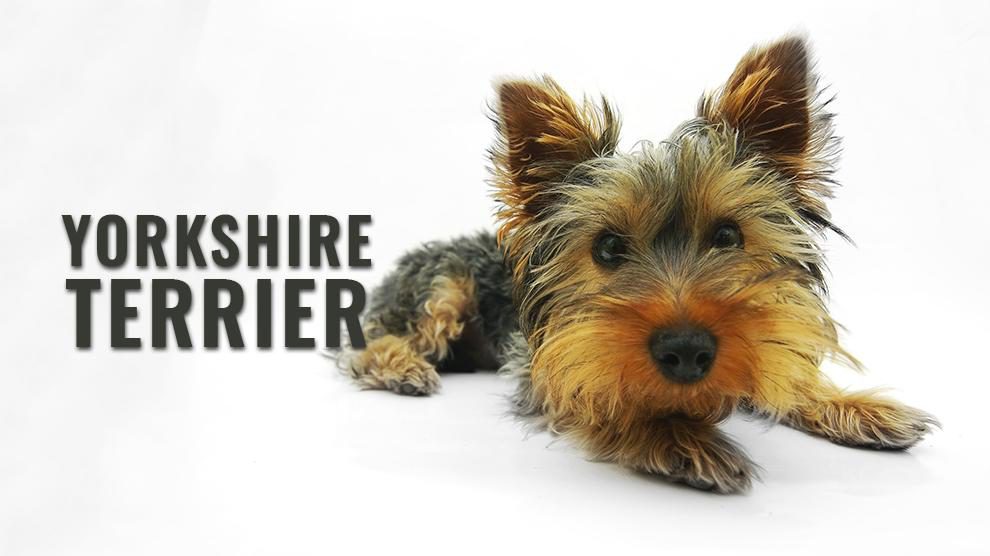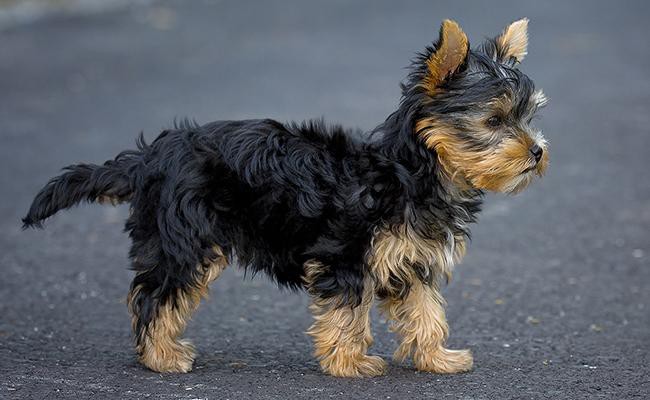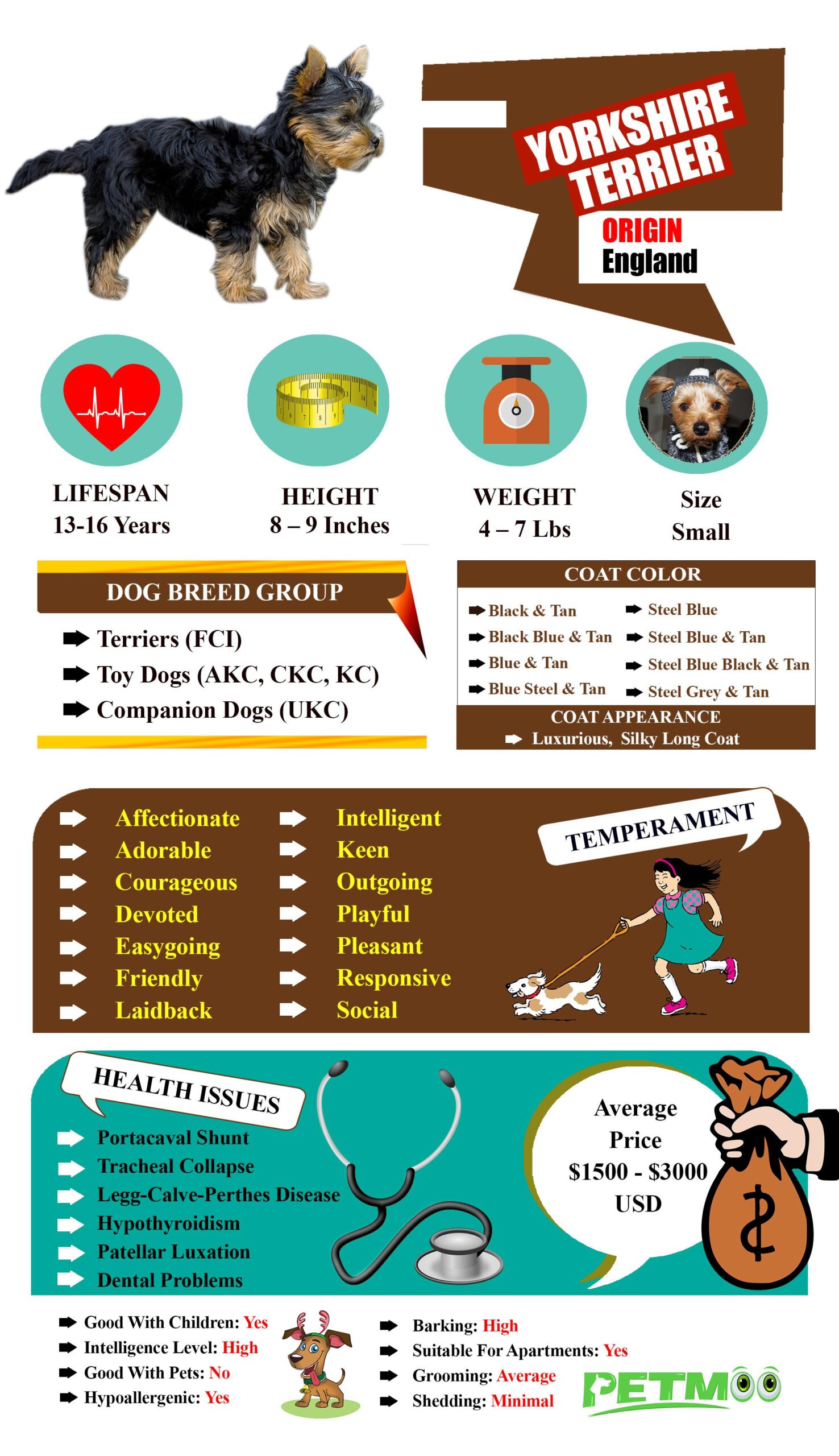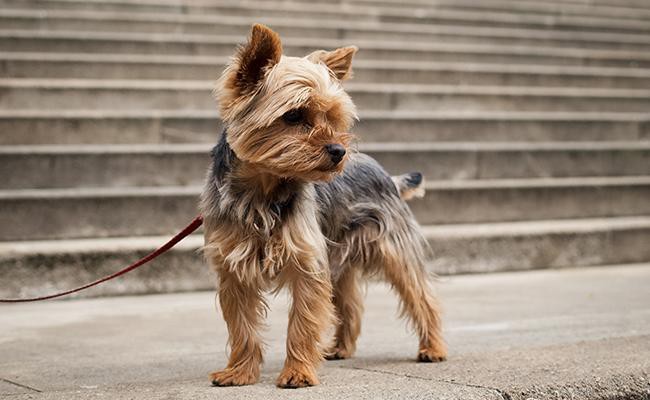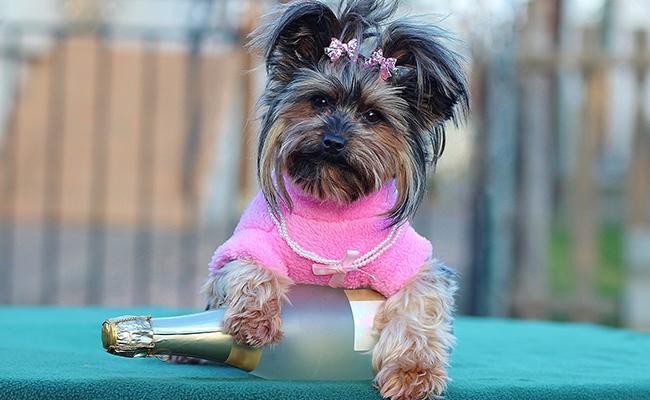Dog Pregnancy Calculator And Timeline
With their captivating charm, luxurious coat, and unwavering loyalty, Yorkshire Terriers, or Yorkies, have won the hearts of dog enthusiasts worldwide.
Originating in Yorkshire, England, these small and spirited dogs were initially bred for their rat-catching skills but have since become cherished companions.
Whether you are a potential owner or simply curious about this beloved breed, let us embark on a journey to discover the delightful nature of Yorkshire Terriers.
Yorkshire Terrier Breed Characteristics
- Origin: England
- Size: Small
- Dog Breed Group: Terriers (FCI), Toy Dogs (AKC, CKC, KC), Companion Dogs (UKC)
- Purebred: Yes
- Lifespan: 13-16 Years
- Height: 20–23 Cm (8–9 In)
- Weight: 1.81 -3.17 Kg (4–7 Lb)
- Coat Appearance: Luxurious, Silky Long Coat
- Coat Colors: Black & Tan, Black Blue & Tan, Blue & Tan, Blue Steel & Tan, Steel Blue, Steel Blue & Tan, Steel Blue Black & Tan, Steel Grey & Tan
- Temperament: Affectionate, Adorable, Courageous, Devoted, Easygoing, Friendly, Laidback, Intelligent, Keen, Outgoing, Playful, Pleasant, Responsive, Social, Spirited
- Good With Children: Yes
- Intelligence Level: High
- Good With Pets: No
- Hypoallergenic: Yes
- Grooming: Average
- Shedding: Minimal
- Barking: High
- Suitable For Apartments: Yes
- Need For Exercise: Average
- Easy To Train: Yes
- Good For First-Time Owners: Yes
- Health Issues: Portacaval Shunt, Tracheal Collapse, Legg-Calve-Perthes Disease, Hypothyroidism, Patellar Luxation, Dental Problems
- Litter Size: 2-5 Puppies
- Average Price: $500 – $1000, £700 For KC Registered, £500 For Non-KC Registered
Yorkshire Terrier History
The Yorkshire Terrier originated in the 19th century in the county of Yorkshire, England. Initially bred as working dogs, their primary purpose was to catch rats and other vermin in mine shafts and textile mills.
Over time, their popularity grew, and they transitioned from working-class dogs to beloved companion animals. The breed’s development is influenced by several small terrier breeds, including the Waterside Terrier and the Clydesdale Terrier, which no longer exist today.
Is Yorkshire Terrier, The Right Dog For You?
If you want a dog who…
- Is a smallish, yet light, fine-boned, quick-moving sprite
- Is polite with people and peaceful with other pets
- Sheds lightly (often a good choice for allergy sufferers)
- Doesn’t need much outdoor exercise and is easy to train
- Makes a keen watchdog-won’t fail to announce strangers
A Yorkie may be right for you.
If you don’t want to deal with…
- Small dog syndrome and fragility of toy breeds
- Housebreaking difficulties and Emotional sensitivity
- “Separation anxiety” (barking and destructiveness) when left alone for long periods
- Prey drive and Excitable chasing instincts
- High maintenance on the grooming part
A Yorkie may not be right for you.
What every Yorkshire terrier owner knows
- They’re a huge problem and they steal everything: your shoes, your whole heart, etc.
- You are familiar with the frantic, rather pathetic excuse of their bark – also referred to as the ‘yap’.
- They’re rude. They’re always sticking out their tongues, especially when they’re out in public
- You will spend hours browsing Yorkie attires online –or, you’ve at least thought about it if you haven’t dressed up your Yorkie as of yet.
- Yorkies are CREEPS! They’re always spying on you and find secret little places to snoop what’s going on.
- Even worse, if they find you’re depressed and want to be left alone, they’ll jump through hoops to give you love and solace.
- You laugh when others say that having a smaller dog would mean a smaller amount of canine energy.
- They are more photogenic than you do.
- You cherish their sleeping time: these feisty little creatures, all energy results in a lot of sleep. When they are awake, they will be ‘yapping’ for some treats.
- And they don’t understand anything. You can understand from their adorable head tilts
Yorkshire Terrier Size
Yorkshire Terriers are recognized as a small breed. As per breed standards, adult Yorkies typically stand between 6 to 7 inches (15-17 cm) at the shoulder and weigh around 4 to 7 pounds (1.8-3.2 kg).
Their compact size makes them well-suited for apartment living and travel, and they are often referred to as “teacup” or “toy” dogs due to their diminutive stature.
Yorkshire Terrier Lifespan
The lifespan of a Yorkshire Terrier is influenced by several factors, including genetics, diet, exercise, and overall healthcare. On average, Yorkies live between 12 to 15 years, although it is not uncommon for them to surpass this range with proper care.
Regular veterinary check-ups, a balanced diet, regular exercise, and a loving environment are essential to ensure a long and healthy life for your Yorkshire Terrier companion.
Yorkshire Terrier Coat Color
- Black & Tan
- Black Blue & Tan
- Blue & Tan
- Blue Steel & Tan
- Steel Blue
- Steel Blue & Tan
- Steel Blue Black & Tan
- Steel Grey & Tan
Yorkshire Terrier Appearance
Well-balanced, small (Toy-type) terrier, a long, luxurious, and straight-flowing coat, readily identified by its “blue” (shiny gray) and tan. The hair is parted on the muzzle and hangs evenly from the base of the skull to the end of the tail.
The body is square, compact, and well-proportioned. The dog’s high head carriage, spirited with even disposition gives the appearance of strength and superiority.
Facial Region:
Their heads are small in proportion to the size of the dog without being domed and they boast a well-defined stop with a square, short and finely boned, not too long muzzle.
They have a dark nose and lovely medium, large dark eyes and alert, keen albeit pleasing expressions. Floppy, feathered v-shaped ears that are set wide apart, and these dogs carry drooping down.
They have strong jaws with perfect scissor bite
Body:
Nicely proportioned necks that dogs carry well arched with nice reach to the well laid back shoulders. They have a straight, short but strong front leg covered in rich golden tan hair (lighter at the tips than it is at the roots).
They possess a level back, well-sustained loin, and a nice broad chest with well-sprung rib cages. They have muscular hindquarters with fine-boned and nicely feathered back legs with rich golden tan hair.
The medium-length tails are set high and these dogs carry higher than the level of the back
Yorkshire Terrier Care
Proper care is essential to ensure the well-being of your Yorkshire Terrier. They require regular exercise to keep them physically and mentally stimulated, although their small size means they don’t need extensive exercise.
Daily walks, playtime, and interactive toys can help fulfill their exercise needs.
Yorkies are indoor dogs and should not be left outside for extended periods, as they are sensitive to temperature extremes. They thrive in a loving and attentive environment, enjoying close companionship with their owners.
Socialization from an early age is crucial to help them develop good manners and adapt to various situations.
- Exercise Needs – Average
- Intensity – High
- Activity Level – Medium
- Exercise Requirements – >30 Minutes/Day
- Walk Mileage/ Week – 3– 5 Miles
- Playfulness – High
- Grooming Needs – High
- Tendency To Drool – No
- Snore – No
- To Bark – Yes
- Dig – Low
- Social/Attention Needs – High
Yorkshire Terrier Training
Here are some training tips for Yorkshire Terriers to help them become well-behaved and obedient companions:
- Start Early: Begin training your Yorkshire Terrier as soon as you bring them home. Early socialization and basic obedience training are important for their development.
- Positive Reinforcement: Use positive reinforcement techniques such as treats, praise, and rewards to motivate and encourage your Yorkie during training sessions. They respond well to positive feedback and will be more eager to learn and please you.
- Short and Fun Sessions: Yorkies have a relatively short attention span, so keep training sessions brief and engaging. Aim for multiple short sessions throughout the day rather than one long session. Make it fun and incorporate play into the training routine.
- Basic Commands: Teach your Yorkie basic commands like “sit,” “stay,” “come,” and “down.” These commands establish communication and help ensure their safety in different situations.
- Leash Training: Yorkshire Terriers can be prone to leash pulling due to their energetic nature. Use positive reinforcement techniques to train them to walk calmly on a leash without pulling.
- Socialization: Expose your Yorkie to various environments, people, and other animals from an early age. This helps them become well-adjusted and comfortable in different situations.
Yorkshire Terrier Temperament
Yorkshire Terriers have a distinct and captivating temperament. They are known for their confidence, boldness, and affectionate nature.
Despite their small size, they often exhibit a fearless and lively personality, which makes them excellent watchdogs. They are fiercely loyal to their owners and form strong bonds with their families.
Yorkies are generally good with children, although supervision is necessary to prevent accidental injury due to their delicate size.
Early socialization is important to ensure they get along well with other pets and strangers. Their intelligence and eagerness to please make them highly trainable, although consistency and positive reinforcement methods work best.
Adaptability:
- Apartment Living – Yes
- Good For First-Time Owners – Yes
- Sensitivity Level – High
- Loneliness – Hates To Be Left Alone
- Cold Weather – Good
- Hot Weather – Good
Friendliness:
- With Family – High
- Kids – High
- Other Dogs – Good, If Raised Together
- Cats – Good, If Raised Together
- Other Pets – Good, If Raised Together
- Strangers – Suspicious
General Behavior:
- Independence – Yes
- Dominance – Average
- Combativeness – Yes
- Indoors – Active
- Outdoor – Active
- Territorial – Average
- Easy Of Transportation – High
Yorkshire Terrier Food
Here are some food suggestions for Yorkshire Terriers to ensure they receive a balanced and nutritious diet:
- High-Quality Dry Dog Food: Opt for a reputable brand of dry dog food specifically formulated for small breeds. Look for options that contain high-quality proteins (such as chicken or fish), whole grains, and a balance of essential vitamins and minerals.
- Wet or Canned Dog Food: Supplement your Yorkie’s diet with occasional servings of wet or canned dog food. Choose varieties that are free from artificial additives and provide a good source of protein and healthy fats.
- Fresh Lean Meats: Cooked lean meats like chicken, turkey, or lean beef can be a tasty and protein-rich addition to your Yorkie’s diet. Ensure the meat is boneless, skinless, and properly cooked to avoid any potential health risks.
- Fresh Fruits and Vegetables: Offer small portions of dog-safe fruits and vegetables as treats or additions to meals. Blueberries, apple slices, carrot sticks, and green beans are excellent choices. Avoid grapes, raisins, onions, and garlic, as they can be toxic to dogs.
- Grain-Free Options: Some Yorkshire Terriers may have sensitivities or allergies to grains. Consider grain-free dog food options that use alternative sources of carbohydrates like sweet potatoes or peas.
- Limited Treats: Yorkies have a tendency to gain weight easily, so be mindful of the number and size of treats you offer. Opt for small, low-calorie treats specifically made for small breeds and use them sparingly during training or as rewards.
Yorkshire Terrier Grooming
- Coat Density – Normal
- Coat Length – Medium
- Coat Texture – Straight
- Brushing Frequency – Daily
- Trimming/Stripping – Yes
- Hypoallergenic – Yes
- Shedding – Minimal
Yorkshire Terriers have a stunning, silky coat that requires regular maintenance to keep it in good condition. Their hair grows continuously and does not shed like most breeds, making them a popular choice for individuals with allergies.
To prevent matting and tangles, daily brushing is recommended using a fine-toothed comb or a slicker brush. Regular bathing is necessary to keep their coat clean and healthy, with special attention given to their ears and teeth.
Yorkshire Terrier Health Issues
While generally healthy, Yorkshire Terriers are susceptible to certain health issues. Patellar luxation, a condition where the kneecap dislocates, is commonly seen in smaller breeds, including Yorkies.
Additionally, they may be prone to dental problems, such as tooth loss and gum disease, so regular dental care is crucial. Yorkies can also develop tracheal collapse, a condition affecting the windpipe, and portosystemic shunts, a liver disorder.
Responsible breeders perform health screenings on their breeding dogs to minimize the risk of such conditions.
Yorkshire Terrier Puppies Names
Yorkshire Terrier Male Puppy Names
- Archie
- Billy
- Connor
- Dylan
- Champ
- Jax
- Miles
- Max
- Ned
- Spud
Yorkshire Terrier Female Puppy Names
- Artie
- Brooke
- Cassidy
- Diva
- Florie
- Lexie
- Maggie
- Mia
- Sasha
- Viola
What Are Girl Dog Names For Yorkies?
- Alpine
- Bertha
- Frisky
- Fifi
- Ciao
- Buttercup
- Velvet
- Olivia
- Rosie
- Ushki
- Zuni
- Xena
- Yahoo
- Nellie
Yorkshire Terrier Price
The price of a Yorkshire Terrier can vary depending on various factors, including the breeder’s reputation, bloodline, location, and the quality of the dog.
On average, you can expect to pay between $1,000 and $3,000 for a well-bred Yorkshire Terrier puppy from a reputable breeder.
It is important to note that while the initial cost may seem high, investing in a well-bred Yorkie can save you money in the long run by reducing the likelihood of costly health issues.
Alternatively, adoption from a rescue or shelter is another option, with adoption fees typically ranging from $100 to $500.
Yorkshire Terrier Breeders
When looking for a Yorkshire Terrier, it is important to find a reputable breeder who prioritizes the health and well-being of their dogs.
A responsible breeder will conduct health screenings on their breeding dogs, provide proper socialization and care for the puppies, and be knowledgeable about the breed.
Research breeders carefully, ask for references, and visit their facilities to ensure they maintain high standards of breeding.
Reputable breeders will be happy to answer your questions and provide you with information about the breed’s health, temperament, and any potential genetic issues.

Click here to find Yorkshire Terrier breeders in the USA.
Conclusion
The Yorkshire Terrier is a charming and delightful companion that brings joy and love into the lives of many.
With their rich history, small size, luxurious coat, and loving temperament, they have rightfully earned their place as one of the most popular dog breeds today.
By understanding their history, caring for their grooming needs, addressing potential health issues, and providing them with proper care and training, you can enjoy a fulfilling and long-lasting relationship with your Yorkshire Terrier companion.

